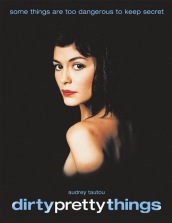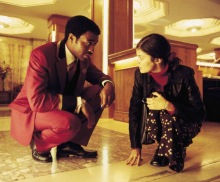|
Dirty Pretty Things
|
| |
 |
UK/USA, 2002. Rated PG-13. 132 minutes.
Cast:
Chiwetel Ejiofor, Audrey Tautou, Sergi López, Sophie Okonedo, Benedict
Wong, Zlatko Buric
Writer: Steven Knight
Music: Nathan Larson
Cinematography: Chris Menges
Producers: Tracey Seaward, Robert Jones
Director: Stephen Frears
LINKS
|
Read the AboutFilm feature and interview with Audrey Tautou.
" ow come I've never seen you before?" demands the Englishman of Okwe (Chiwetel
Ejiofor), an illegal immigrant from Nigeria living in London.
ow come I've never seen you before?" demands the Englishman of Okwe (Chiwetel
Ejiofor), an illegal immigrant from Nigeria living in London.
"Because we're the people you do not see," replies Okwe.
It's the most explicit statement in Dirty Pretty Things, an intensely
political film from veteran director Stephen Frears (My Beautiful Laundrette,
Dangerous Liaisons, High Fidelity), set in the confining and desolate world
of London's marginal inhabitants—the ones who aren't supposed to be there,
whose every moment of survival is a hard-won victory in an endless battle that
often ends in deportation or death.
Did I say living in London? Hiding out in London is more like it. Okwe works
two job, dodges immigration officers, and grabs a few hours' rest anywhere he
can, like in the mortuary at the hospital where his buddy Guo Yi (Benedict Wong)
works as a porter. Okwe is a doctor by training, but now he's driving a cab,
and working the redeye shift at the front desk of the seamy Baltic Hotel. Okwe
shares a flat and some kind of a bond with lovely Senay (Audrey Tautou), a young
Turkish illegal who makes beds and swabs toilets at the Baltic, but there is
no time or energy for love when you're trying just to get from one day to the
next.
Okwe keeps to himself and stays out of other people's business, but medical
services are in demand among the city's disenfranchised. Other people's business
tends to come to him. One night, in room 510 of the Baltic Hotel, Okwe discovers
something that would make even David Lynch queasy. The discovery draws him from
his everyday dangers into deeper peril.
The acting is superb. Okwe is an unlikely and understated hero with a rich
inner life that Ejiofor lets flicker across his face occasionally. As hotel
manager Sneaky, whose ethics are as fungible as the blood money that passes
through his hands, Sergi López does the convivial villain thing well, and Sophie
Okonedo is credible and sweet as that old standby, the Hooker with the Heart
of Gold. The standout is Tautou. It's a good thing Frears hadn't yet seen Amélie,
because he might never have cast Tautou otherwise. Forget what Tautou looks
like in the poster for Dirty Pretty Things—that's marketing bullshit.
Imagine Tautou for a moment as Amélie Poulain—that curling semicircle of
a smile, those beguilingly mischievous eyes underneath playfully arching brows,
the vibrant makeup, and that odd bob of a haircut. Are you visualizing her?
Good. Now imagine a young woman completely the opposite of that. That's Tautou
in Dirty Pretty Things, world-weary and worn down, her huge eyes flat
and hardened. When she speaks, it's not in French-accented English; it's in
Turkish-accented English. Can you imagine how difficult it must be to speak
a language with a foreign accent when you only speak it with a different foreign
accent? It's an astonishing transformation.
London is just as unrecognizable. The London of the illegals is an anonymous
underworld that props up the rich, cosmopolitan London most people are used
to. This London meets with that London only in exploitive sweatshops and sordid
hotel rooms. There are no spacious squares and beautiful bridges in their London,
only grime, anguish, and constant fear. If their London is an underworld, the
Baltic Hotel is a gate to a deeper Hell, where dirty things occur and are rendered
pretty again by morning, as Sneaky observes. In contrast to the gray, dingy
city, the Baltic pulses with malevolent energy.
Dirty Pretty Things is a movie with Things to Say on an Important Issue—the
treatment of illegals in the developed countries—but one whose political
intentions have not overpowered its quietly gripping story—a kind of gothic
horror tale, as Frears has aptly described it. Instead of making a nihilistic
film that focuses on his characters' despair, he has powered the film with their
indomitable drive to survive. That makes for compelling viewing, and may open
a few eyes in the process.
Review
© July 2003 by AboutFilm.Com and the author.
Images © 2003 Miramax Film Corp. All Rights Reserved.


